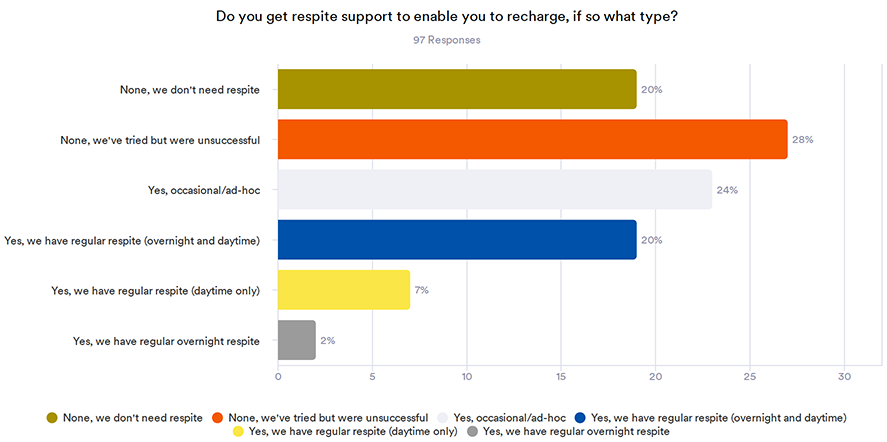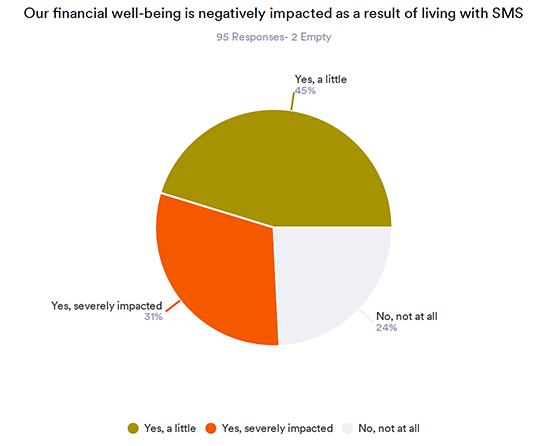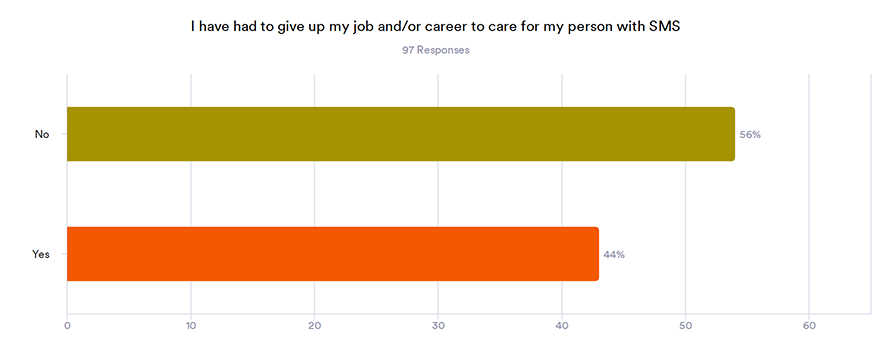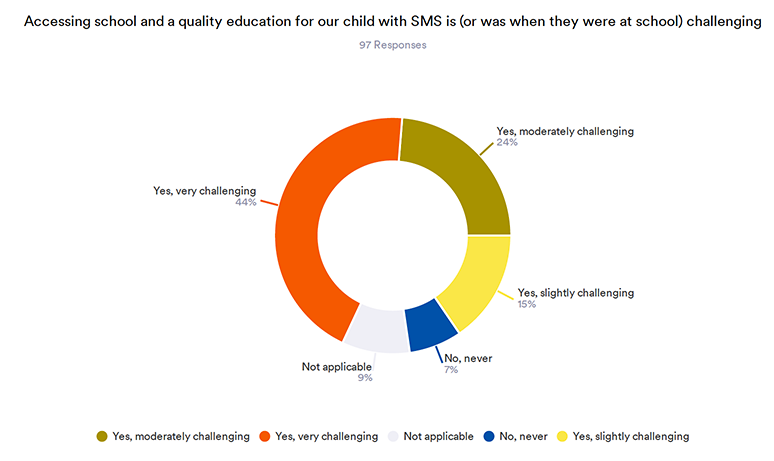In the pursuit of a more inclusive and supportive future for individuals and families living with SMS, we recently conducted a community survey. Our objective was to gain a deeper understanding of the needs, challenges, and experiences of our community members. The results of this survey have unveiled startling statistics that emphasise the importance of addressing the mental and emotional well-being of our community, the financial impacts it brings, and the necessity for better support systems for caregivers.
The age breakdown of individuals with SMS in our survey revealed a diverse range of respondents. Approximately 45% are in the junior and senior school age group (5-18), 37% represent adults (18+), and 18% of respondents encompass infants and pre-school children (0-5).
Emotional Well-being and Caregiver Stress and Support
One of the most compelling findings from our survey was the impact of SMS on the emotional well-being and relationships within families. A staggering 96% of respondents indicated that their family relationships had been affected by SMS. Of this, 49% stated that these effects were pervasive, occurring “most of the time” or “always.”
Furthermore, the survey revealed that 91% of our community have experienced isolation and loneliness due to SMS, with 42% of the respondents reporting that these feelings occurred “most of the time” or “always.”
Caring for someone with SMS can be emotionally taxing, and our survey highlighted the extent of this burden. A staggering 98% of parent/carer respondents reported feeling stressed and/or anxious as a result of caring for a person with SMS. Nearly half (49%) of these individuals stated that this stress was a constant presence in their lives, emphasising the need for caregiver support systems.

Respite care, which is vital for caregivers to recharge and maintain their own well-being, was another area of concern. Unfortunately, only 20% of respondents reported having regular overnight and daytime respite care, with just 7% receiving regular daytime respite. Shockingly, only 2% had access to regular overnight respite care, and 20% had attempted to access respite support but were unsuccessful. This is particularly disheartening given the severe sleep disturbances commonly associated with SMS.

Emotional Support
The survey revealed that 83% of our community members felt the need for emotional support from The SMS Foundation. This support encompasses various channels, including a telephone helpline, social media groups, email, messenger apps, and email. A significant 13% of respondents expressed that they required substantial emotional support.

Information Needs
In terms of information needs, respondents prioritised the following areas:
- 65% requested guidance and training on managing SMS behaviour.
- 61% sought information and support related to health and medical needs.
- 57% were interested in information and guidance on managing SMS sleep patterns.
- 49% required assistance with accessing benefits and support.
- 47% needed guidance and support for education and schools.
- 44% asked for general information and guidance about SMS and its symptoms.
- 36% expressed a desire to connect with other SMS families, emphasising the importance of community-building.
Financial and Career Implications of Living with SMS
Next we delved into the financial challenges and career implications faced by our community members. The results were eye-opening and underscore the pressing need for greater support in these areas.
When asked about the financial impact of living with SMS, 31% of respondents reported that their financial well-being was “severely impacted” while 45% indicated it was impacted “a little”. Only 24% reported that their financial well-being was “not impacted at all”.

Balancing a job or career with the care needs of a child or adult with SMS proved to be another significant challenge. When asked about taking time off work due to additional care needs, 47% of respondents stated that they had to take a lot of time off, while 38% reported taking some time off. Only 14% claimed to be unaffected by their caregiving responsibilities.
Furthermore, a staggering 58% of caregivers reported that their job and career options were “severely limited”. In a poignant revelation, 44% of caregivers had to give up their job or career entirely due to the demands of caring for someone with SMS.

Educational Challenges
Education plays a vital role in the lives of individuals with SMS, and we wanted to understand the educational journeys of our community members. Respondents were asked to rate their experience of accessing school and obtaining a quality education for their child with SMS. The results showed that 44% found it “very challenging”, 24% deemed it “moderately challenging”, and 15% found it “mildly challenging”. Only 7% reported that it was “not challenging.”

Adult Life with SMS
Transitioning into adulthood can be a particularly complex phase for individuals with SMS. The survey enquired about employment opportunities for adults with SMS, revealing that only 2% had found independent employment.
The survey also sought to understand the support and opportunities available to adults with SMS. While 59% were not yet adults and answered “not applicable” for the remainder, 20% did not have a support worker or help during the week, only 13% had support throughout the working week, and 9% received support on some working days.
Healthcare Challenges
In terms of healthcare challenges, the survey uncovered several concerns. A significant 44% of respondents reported “always” experiencing a lack of awareness about SMS when talking to medical personnel. Additionally, 36% found that medical personnel “always” lacked understanding about the healthcare needs of their child or adult with SMS. Furthermore, 32% “always” faced challenges in obtaining treatments and therapies to support the healthcare needs of their loved ones, while 29% “always” experienced stress at healthcare appointments due to complex and challenging SMS behaviours.

Support and Services Provided by the SMS Foundation
The survey also gauged the specific support and information needs of our community members. In order of priority, our community expressed the following needs:
- 36% sought emotional support from individuals who understand SMS and carer’s needs.
- 33% required guidance and advice on SMS adult living options.
- 31% sought support and information to access disability and/or carer benefits.
Finally, the survey asked respondents about their usage of support and services provided by the SMS Foundation in the past. The results were as follows:
- 91% had visited the SMS Foundation’s website for information.
- 69% had used the SMS guideline booklet.
- 68% had sought advice or support through social media groups and/or messenger.
- 63% had attended one of the SMS Foundation’s conferences.
These findings demonstrate the impact of support already provided by the SMS Foundation whilst highlighting the continued need for further support and services.
Conclusion
The findings from our community survey illuminate the challenges faced by individuals and families living with SMS, from emotional strain to a lack of adequate support. The SMS Foundation UK remains dedicated to addressing these challenges head-on. Our commitment to providing emotional support, information, and advocacy for our community will continue to grow stronger.

 Elizabeth’s Inspiring Journey: Marching with Confidence on Armed Forces Day
Elizabeth’s Inspiring Journey: Marching with Confidence on Armed Forces Day